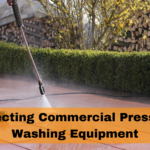
Choosing a Pressure Washer for Home Use
Pressure washing is an efficient and satisfying way to clean outdoor surfaces, vehicles, and even certain types of indoor flooring. Whether it’s for removing dirt from a driveway, cleaning a deck, or washing your car, the right pressure washer can make any cleaning job easier. Here’s a comprehensive guide to help you select the ideal pressure washer for your home use.
Understanding Pressure Washers
When it comes to maintaining the cleanliness and aesthetics of your home’s exterior, a pressure washer is an indispensable tool. However, to make the most out of this equipment, it’s important to understand what a pressure washer is and how it operates.
What is a Pressure Washer?
A pressure washer, sometimes known as a power washer, is a high-powered cleaning tool that uses a motor (either electric or gasoline-powered) to pump water at high pressure through a concentrating nozzle. This results in a powerful stream of water that can dislodge dirt, grime, and other substances from a variety of surfaces.
How Does a Pressure Washer Work?
The basic mechanism of a pressure washer involves drawing water from a source (like your home’s water supply) and then accelerating it through a pump. This pump, powered by an electric motor or a gasoline engine, increases the water’s pressure before it is released through a spray wand. The intensity of the water jet enables it to clean surfaces much more effectively than a regular hose.
Key Components of a Pressure Washer
- Engine or Motor: This is the heart of the pressure washer. Gas engines are usually more powerful and used for heavier tasks, while electric motors are suitable for lighter, residential use.
- Pump: The pump is what builds up the pressure. It is the core component that determines the power and effectiveness of the pressure washer.
- Nozzle: The nozzle at the end of the wand can be adjusted or replaced to change the pressure and spread of the water jet. Different nozzles are suited for different cleaning tasks.
- Hose and Wand: The hose carries the pressurized water to the wand, which is directed by the user to clean surfaces.
Types of Pressure Washers
- Electric Pressure Washers: These are quieter, lightweight, and generally easier to start compared to gas models. Ideal for light-duty tasks like cleaning patio furniture, grills, and vehicles.
- Gas Pressure Washers: These offer higher pressure and are suitable for heavy-duty tasks like cleaning concrete, stripping paint, and cleaning large areas.
- Hot Water Pressure Washers: These are specialized models that heat the water, providing enhanced cleaning power for removing oil, grease, and other stubborn substances.
Benefits of Using a Pressure Washer
- Efficiency: Cleans surfaces much faster and more effectively than traditional methods.
- Water Conservation: Despite their power, pressure washers typically use less water than a garden hose performing the same task.
- Versatility: Can be used on a wide range of surfaces, including driveways, decks, siding, and vehicles.
- Environmental Friendly: Reduces the need for harsh chemicals in many cleaning tasks.
Types of Pressure Washers
Choosing the right type of pressure washer is crucial for effective and efficient cleaning. The type you select should align with the cleaning tasks you plan to undertake. Here’s an overview of the different types of pressure washers available, each suited for specific uses and preference.
Electric Pressure Washers
Characteristics:
- Power Source: Runs on electricity.
- Noise Level: Generally quieter than gas models.
- Portability: Often lightweight and easy to maneuver.
- Maintenance: Requires less maintenance than gas models.
Suitable For:
- Light to medium-duty tasks such as cleaning cars, patio furniture, small decks, and bikes.
- Indoor use or in areas where noise is a concern.
Gas Pressure Washers
Characteristics:
- Power Source: Powered by gasoline engines.
- Noise Level: Louder than electric models.
- Portability: Typically heavier and may require more storage space.
- Maintenance: Requires regular engine maintenance.
Suitable For:
- Medium to heavy-duty tasks such as cleaning driveways, sidewalks, large decks, and exterior siding.
- Jobs requiring more mobility or where electrical outlets are not easily accessible.
Battery-Powered Pressure Washers
Characteristics:
- Power Source: Operated by rechargeable batteries.
- Noise Level: Relatively quiet, similar to electric models.
- Portability: Highly portable, ideal for spot-cleaning and on-the-go tasks.
- Maintenance: Minimal; battery needs regular charging.
Suitable For:
- Light tasks and quick clean-ups like washing garden tools, small patios, or bicycles.
- Use in remote locations without access to power outlets.
Hot Water Pressure Washers
Characteristics:
- Power Source: Typically gas or diesel-powered; heats water.
- Noise Level: Similar to standard gas models.
- Portability: Generally larger and less portable.
- Maintenance: Requires more maintenance due to heating elements.
Suitable For:
- Industrial-level cleaning tasks.
- Removing grease, oil, and heavy soiling that cold water can’t effectively clean.
Stationary Pressure Washers
Characteristics:
- Power Source: Electric or gas; designed to stay in one place.
- Noise Level: Depends on the power source.
- Portability: Non-portable, fixed installations.
- Maintenance: Similar to corresponding electric or gas models.
Suitable For:
- Fixed cleaning stations, like in a business or workshop setting.
- Continuous or frequent use in a dedicated area.
Professional Grade Pressure Washers
Characteristics:
- Power Source: Gas or diesel engines with high PSI and GPM ratings.
- Noise Level: Generally louder due to powerful engines.
- Portability: Varies; some are designed for stationary use, while others are mounted on trailers for mobility.
- Maintenance: Requires professional-level maintenance.
Suitable For:
- Commercial and industrial applications.
- Heavy-duty tasks that require prolonged use and high cleaning power.
Power and Performance
When selecting a pressure washer, understanding its power and performance capabilities is crucial. These factors determine how effectively and efficiently you can complete your cleaning tasks. Two key metrics to consider are PSI (Pounds per Square Inch) and GPM (Gallons Per Minute). Let’s delve into these terms and how they impact the functionality of a pressure washer.
Understanding PSI (Pounds per Square Inch)
- Definition: PSI measures the pressure of water delivered by the pressure washer. It indicates the force with which water hits the surface being cleaned
- Impact on Cleaning: Higher PSI means more power to break down and remove tough dirt and grime. Residential models typically range from 1,300 to 2,800 PSI, suitable for most home applications.
- Choosing the Right PSI: For delicate surfaces like car paint or windows, a lower PSI is advisable. For tougher stains and hard surfaces like concrete, higher PSI is more effective.
Understanding GPM (Gallons Per Minute)
- Definition: GPM measures the flow rate of water coming out of the pressure washer. It indicates how much water is used during cleaning.
- Impact on Cleaning: Higher GPM results in faster cleaning as it covers more area and rinses away dirt more quickly.
- Choosing the Right GPM: Consider water availability and drainage when selecting GPM. A higher GPM means more water used, which may not be ideal in areas with water use restrictions.
Balancing PSI and GPM
- Effective Cleaning: A balance between PSI and GPM is crucial for effective cleaning. Higher PSI can compensate for lower GPM and vice versa.
- Cleaning Units (CU): Sometimes, pressure washers are rated in Cleaning Units (CU), calculated by multiplying PSI by GPM. This number gives a more comprehensive idea of the machine’s overall cleaning power.
Electric vs. Gas Pressure Washers: Power Differences
- Electric Models: Typically offer lower PSI and GPM, making them ideal for light to medium-duty tasks around the home.
- Gas Models: Offer higher PSI and GPM, suitable for tougher, larger-scale cleaning tasks.
Considerations for Home Use
- Size and Frequency of Tasks: For smaller, more frequent tasks, a lower PSI and GPM might be sufficient. For larger areas or tougher grime, look for higher ratings.
- Water and Energy Efficiency: Balance power with efficiency. More powerful models might clean faster but could use more water or energy.
Portability and Size
When selecting a pressure washer, considering its portability and size is crucial, especially for home use. The ease of moving and storing your pressure washer can greatly affect your overall experience and convenience. Here’s what you need to know about the portability and size aspects of pressure washers.
Importance of Portability
- Ease of Movement: For many homeowners, the ability to easily move the pressure washer around the property is essential. A portable unit makes it possible to clean different areas, from the backyard to the driveway.
- Storage Requirements: Smaller, more compact models are easier to store, especially in homes with limited storage space.
Size and Weight Considerations
- Electric Pressure Washers: These are generally lighter and more compact than gas models, making them a preferred choice for those who prioritize ease of movement and storage.
- Gas Pressure Washers: Often heavier and bulkier due to their engine components. However, they usually come mounted on wheeled carts to aid in mobility.
Design Features Enhancing Portability
- Wheeled Frames: Many pressure washers come with built-in wheels, making them easier to maneuver around your property.
- Carry Handles: For smaller models, a sturdy carry handle can be sufficient for moving the pressure washer short distances.
- Hose and Cord Management: Features like built-in hose reels or cord holders can make transport and storage more manageable.
Compact and Lightweight Options
- Handheld Models: Some manufacturers offer ultra-compact, handheld pressure washers, ideal for light tasks and maximum portability.
- Vertical vs. Horizontal Designs: Vertical designs tend to be more space-saving, whereas horizontal models might offer greater stability but take up more room.
Trade-offs Between Power and Portability
- Power Considerations: Generally, there’s a trade-off between power and portability. Higher-powered models (higher PSI and GPM) are often larger and less portable.
- Balancing Needs: Assess your specific needs. If you require high power for tough cleaning tasks, you might need to compromise on portability, and vice versa.
Tips for Choosing the Right Size
- Assess Usage Frequency and Scope: If you’re using the pressure washer frequently for a variety of tasks, opt for a model that strikes a balance between power and portability.
- Consider Storage Space: Ensure the model you choose can be easily stored in your garage, shed, or storage area.
Attachments and Accessories
The versatility and effectiveness of a pressure washer can be significantly enhanced by using the right attachments and accessories. These add-ons can transform your pressure washer into a multi-purpose tool, capable of tackling a wide range of cleaning tasks with ease. Here’s a look at some common attachments and accessories you should consider.
1. Different Types of Nozzles
- Adjustable Nozzles: Allow you to change the spray pattern and pressure directly from the nozzle, offering flexibility without the need to switch nozzles.
- Turbo Nozzles: Rotate the water stream in a circular pattern for more powerful cleaning, ideal for tough stains and hard surfaces.
- Soap Nozzles: Designed for use with detergents, these nozzles lower the pressure to allow for soap application.
2. Extension Wands
- Purpose: Help to reach high or hard-to-reach areas without the need for a ladder, such as second-story siding or tall vehicles.
- Types: Available in various lengths and materials, some even telescoping for adjustable reach.
3. Surface Cleaners
- Design: A flat, circular attachment that evenly distributes pressure over a larger area.
- Use: Ideal for cleaning large, flat surfaces like driveways, patios, and decks, providing consistent cleaning without leaving streaks.
4. Brush Attachments
- Variety: Ranging from rotating brushes to utility brushes, these attachments are designed to scrub surfaces while pressure washing.
- Applications: Perfect for more delicate surfaces where a softer touch is needed, like windows or vehicles.
5. Foam Cannons
- Functionality: Mix soap with water and air to create thick foam, which is then sprayed onto the surface for effective cleaning.
- Benefits: Enhances cleaning power, especially for vehicles, by allowing the soap to soak and break down dirt and grime.
6. Hose Reels
- Advantage: Keeps the pressure washer hose organized and prevents kinks and tangles.
- Types: Some models come with built-in hose reels, or they can be purchased as separate attachments.
7. Pump Protectors
- Purpose: Protects and prolongs the life of the pressure washer pump, especially during storage.
- Use: A solution is added to the pump to lubricate the seals and prevent corrosion.
8. Gutter Cleaning Attachments
- Design: Curved or angled wands that allow for easy cleaning of gutters without the need for a ladder.
- Effectiveness: Enables you to clear out leaves, debris, and blockages safely from the ground.
Safety Features
Safety should always be a paramount consideration when operating a pressure washer. These powerful machines, if not used correctly, can pose risks to both the operator and the surfaces being cleaned. Fortunately, modern pressure washers come with a variety of safety features designed to minimize these risks. Understanding and utilizing these features is key to a safe and effective cleaning experience.
Trigger Locks
- Purpose: Prevents accidental activation of the pressure washer.
- Functionality: A mechanism that locks the trigger in the off position, ensuring the washer can’t be turned on unintentionally.
Thermal Relief Systems
- Importance: Protects the pressure washer from overheating.
- Operation: These systems route hot water away from the pump if it gets too hot, usually during prolonged use, thereby preventing damage.
Pressure Control
- Function: Allows the user to adjust the pressure output, catering to different surfaces and cleaning needs.
- Benefit: Prevents damage to delicate surfaces and reduces the risk of injury due to high pressure.
GFCI Plugs
- Use: Particularly on electric pressure washers, Ground Fault Circuit Interrupter (GFCI) plugs help prevent electric shock.
- Advantage: Automatically cuts off power if an electrical fault is detected, adding an essential layer of safety in wet conditions.
Nozzle Safety
- Design: Nozzles are designed to provide different spray patterns and pressures to suit various cleaning tasks.
- Safety Aspect: Using the correct nozzle minimizes the risk of damaging surfaces or causing injuries due to inappropriate pressure levels.
Water Inlet Filters
- Purpose: Filters debris from the incoming water supply.
- Significance: Prevents debris from entering the pump, which can cause damage and pose a safety hazard.
Automatic Shut-off Systems
- Mechanism: This feature automatically turns off the pump when the trigger is not engaged.
- Benefit: Reduces wear on the pump and prevents accidental high-pressure water bursts.
Sturdy, Non-slip Handles and Wheels
- Importance: Ensure safe and easy maneuverability and handling of the pressure washer.
- Feature: Non-slip handles and robust wheels facilitate safe transportation and usage, especially on uneven surfaces.
Anti-Tipping Design
- Relevance: Prevents the pressure washer from tipping over during use.
- Design: A low center of gravity and a stable base design contribute to the overall stability of the unit.
Safety Manuals and Instructions
- Essential Reading: Always read the manufacturer’s manual and safety instructions before operating a pressure washer.
- Value: Provides specific instructions and safety precautions relevant to your particular model.
Ease of Use
When selecting a pressure washer for home use, ease of use is a critical factor to consider. A user-friendly pressure washer not only makes the cleaning process more efficient but also enhances safety and reduces fatigue. Here are key aspects to consider regarding the ease of use of pressure washers.
Start-Up Process
- Electric Models: Usually feature a simple push-button start, making them very user-friendly, especially for those who may not be comfortable with the pull-start mechanism of gas models.
- Gas Models: Typically require a manual pull-start. Newer models may come with features that make this process easier.
Weight and Handling
- Lightweight Design: Look for models that are easy to carry or move around. This is especially important for tasks that require moving the pressure washer to different locations.
- Ergonomic Handling: Features like padded handles and easy-to-maneuver wheels can significantly reduce strain during use.
Control and Adjustability
- Adjustable Pressure Settings: Some models offer the ability to easily adjust pressure settings, allowing for a versatile cleaning experience suitable for a variety of surfaces.
- User-Friendly Controls: Clearly labeled and conveniently placed controls enhance the ease of operation.
Quick Connect Fittings
- Purpose: Make it easy to attach and detach hoses and nozzles.
- Benefit: Saves time and reduces the hassle of screwing and unscrewing components.
On-Board Storage
- Storage for Accessories: Having dedicated storage spaces for nozzles, hoses, and other accessories on the unit itself can make organization and access much more convenient.
- Impact: Reduces the likelihood of misplacing parts and keeps everything within reach during cleaning tasks.
Clear and Comprehensive Manual
- Importance of Instructions: A well-written, easy-to-understand manual is crucial for first-time users to get acquainted with their pressure washer.
- Content: Should include step-by-step instructions for setup, operation, and maintenance.
Maintenance Requirements
- Simple Maintenance: Opt for models that require minimal and straightforward maintenance. This can include easy-to-clean filters, simple oil change processes for gas models, and accessible components.
- Self-Maintenance Features: Some pressure washers come with features like automatic pump oil level monitoring or self-cleaning functions.
Integrated Detergent Tanks
- Convenience: Integrated tanks make the process of mixing and applying detergents much simpler and more efficient.
- Versatility: Enables easy switching between different types of detergents for various cleaning tasks.
Automatic Shut-off
- Function: A safety feature that also adds convenience by shutting off the pressure washer when the trigger is not engaged.
- Advantage: Saves energy, reduces noise, and prolongs the life of the motor.
Durability and Warranty
When investing in a pressure washer, its durability and the warranty provided are significant factors to consider. A durable pressure washer ensures longevity and reliable performance over time, while a solid warranty offers peace of mind and protection for your investment. Here’s what to look for in terms of durability and warranty when choosing a pressure washer for home use.
Build Quality and Material
High-quality pressure washers are often constructed with robust materials like stainless steel, brass fittings, and high-grade plastics, offering resistance to corrosion, wear, and tear. The overall build of the pressure washer should also be sturdy, indicating a machine capable of withstanding regular use and environmental factors.
Pump Quality
The pump is the heart of a pressure washer, so high-quality pumps are crucial for long-term reliability. Axial cam pumps are common in consumer-grade models for moderate use, while triplex pumps in professional-grade washers offer greater durability for frequent or intensive use.
Engine or Motor Reliability
For electric models, a reliable motor with thermal overload protection is essential to prevent overheating. In gas models, opting for engines from reputable brands known for longevity is advisable.
Hose and Wand Durability
The hose should be both strong and flexible, capable of withstanding high pressures without leaking or bursting. A durable wand and nozzle are also essential for handling high pressure without sustaining damage over time.
Warranty Coverage
The length and details of the warranty are important; a longer warranty period generally indicates manufacturer confidence. Understanding what is covered by the warranty and what is excluded is crucial for assessing the protection offered for your purchase.
Brand Reputation and Customer Service
Researching brand reputation and customer reviews can provide insights into product durability. Good customer support from the brand is also crucial for assistance with maintenance, repairs, and warranty claims.
Ease of Repair and Parts Availability
A pressure washer that is easy to service, with readily available replacement parts, can have its lifespan significantly extended. It’s also beneficial to check the brand’s network of service centers or dealers for maintenance and repair.
User Maintenance
The longevity of a pressure washer is also influenced by proper maintenance. Opting for models that are easy to maintain and come with clear maintenance instructions can ensure a longer lifespan for the equipment.
Price and Value
When it comes to purchasing a pressure washer, finding the right balance between price and value is crucial. This balance is not just about the initial purchase cost, but also about considering the long-term benefits and costs associated with the product. Here’s a breakdown of how to assess price and value when choosing a pressure washer:
Initial Purchase Price
- Budgeting: Determine your budget before starting your search. Pressure washers can range from relatively inexpensive to quite costly.
- Range of Prices: The price varies significantly based on type (electric, gas, battery-powered), power (PSI/GPM), and additional features. Cheaper models might be sufficient for light use, while more expensive models are generally more robust and durable.
Cost-Effectiveness
- Long-Term Investment: A higher initial cost can sometimes mean better quality, durability, and efficiency. This can be more cost-effective in the long run, as the machine may last longer and require fewer repairs.
- Energy and Water Usage: Consider the operating costs, including electricity or gas and water consumption. More efficient models can save money over time, despite a higher upfront cost.
Added Features and Accessories
- Additional Expenses: Accessories and special features can add to the cost but also to the utility and efficiency of the pressure washer. Weigh the benefits of these features against their added cost.
- Customizability: Some models offer more options for customization with accessories, which can be a good value if those features will be utilized regularly.
Maintenance and Repairs
- Maintenance Costs: Consider the long-term maintenance and potential repair costs. Models that are easier and cheaper to maintain might offer better value over time.
- Availability of Parts: A pressure washer with readily available and affordable parts can reduce future expenses and extend the machine’s life.
Warranty and Brand Reliability
- Warranty Considerations: A good warranty can add value, potentially saving repair costs in the future.
- Brand Reputation: Investing in a brand known for reliability and customer service can offer greater value, as this can translate into a hassle-free experience and longevity.
Resale Value
Depreciation: Consider whether the pressure washer will hold its value over time. Some higher-end models and well-known brands may have better resale value.
Total Cost of Ownership
Overall Assessment: Evaluate the total cost of owning the pressure washer over its lifetime, including purchase price, operating costs, maintenance, and potential resale value.
Where to Buy
Purchasing a pressure washer involves selecting not just the right model, but also choosing the best place to buy it. The right retailer can offer not only competitive pricing but also additional benefits such as customer service, after-sales support, and convenient return policies. Here’s a guide on where to look when buying a pressure washer:
Home Improvement Stores
- Examples: Stores like Home Depot, Lowe’s, and Menards offer a wide range of pressure washers. These stores provide the opportunity to see the products in person and often have knowledgeable staff to offer advice.
- Advantages: Immediate availability, hands-on experience before buying, and easy returns or exchanges.
Online Retailers
- Examples: Amazon, Walmart’s online portal, and specialty online stores.
- Advantages: Wider selection, often competitive pricing, and the convenience of home delivery. Online reviews and comparisons can also aid in making an informed decision.
- Considerations: Check for warranty and return policy details before purchasing.
Specialty Equipment Stores
- Focus: These stores specialize in outdoor and power equipment and often carry high-end and professional-grade models.
- Benefits: Expert advice, higher quality models, and sometimes better service and support.
Directly from Manufacturers
- Option: Some manufacturers sell directly to consumers through their websites.
- Pros: Access to the latest models, direct customer support, and sometimes exclusive deals or offers.
Warehouse Clubs
- Examples: Costco, Sam’s Club, and BJ’s Wholesale Club.
- Advantages: Often competitive pricing and the possibility of additional membership benefits or discounts.
Used Equipment Sellers
- Platforms: eBay, Craigslist, and local classifieds.
- Benefits: Potential for lower prices.
- Caveats: No warranty, higher risk, and the need to assess the condition and functionality of the pressure washer carefully.
Seasonal Sales and Promotions
- Opportunities: Watch for sales during key periods like Black Friday, end-of-season clearances, and holiday sales.
- Advantages: Possibility of significant discounts.
Rental Options
Consideration: For those who need a pressure washer only occasionally, renting from a local hardware store or rental center can be a cost-effective alternative.
Introducing Sunset Pressure Wash
For those seeking expert commercial pressure washing services, Sunset Pressure Wash emerges as a standout choice. Their commitment to delivering top-notch cleaning solutions, coupled with the use of advanced technology, positions them as a premier service provider in the field. Whether it’s reviving the façade of a business complex or thoroughly cleaning large outdoor areas, their expertise ensures a level of cleanliness and maintenance that goes beyond the ordinary.
Choosing Sunset Pressure Wash for your commercial pressure washing needs means opting for quality, reliability, and outstanding results. Visit Sunset Pressure Wash today to explore their services and schedule a session. Let their team of experts take care of your commercial space with the professionalism and attention to detail it deserves. Your business’s appearance is a key aspect of its success, and with Sunset Pressure Wash, you can ensure it always looks its best.






